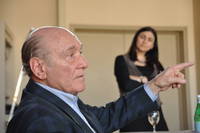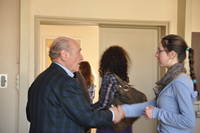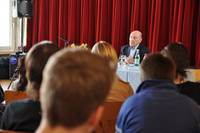What is Holocaust education?
Holocaust education may be seen as a form of education in morale and values that sheds light upon Anti-Semitism, extremism, xenophobia and racism. As of Theodor W. Adorno Holocaust education is "the raising after Auschwitz".
By shedding light upon the causes and consequences of Holocaust, people should learn that those cruelties that happened, shall never happen again.
Encounter between Holocaust survivors and students
Teaching about the Holocaust in schools is an enormous pedagogical challenge, touching on historical facts as well as emotions and even questions about the meaning of life itself. The goal of Holocaust Education is to look at the past in order to learn for the present and the future. Because it also confronts students with experiences of violence, dehumanization, humiliation and mass murder, it also often elicits feelings of disbelief and denial, making it all the more challenging for teachers.
This aspect of education highlights various perspectives: not only that of the victims but the perspective of the perpetrators, the bystanders and those who were courageous enough to save people. Particularly by focusing on the “righteous” people who saved others, positive role models for young people can be studied. Particularly by studying the perpetrators and the bystanders, a better understanding of the mindsets and conditions which led up to the Holocaust can be achieved as well as those conditions which lead still today to the violation of human rights and to genocide.
The perspective of the victims can best be communicated – wherever this is still possible – through direct contact with the survivors. When survivors can bear witness personally or through film or written material, the ability of the students to identify with them and their situation is optimal since it helps to make the otherwise abstract historical information more personal by giving it a name and possibly a face. In addition, contextualizing the recounting of the events of the Holocaust and World War II in terms of the local country (e.g. Switzerland) can help to show where positive help or missed opportunities can be identified and analyzed.
Holocaust Education is increasingly important in the work of TAMACH. It offers consultation to schools and other institutions, to teachers and students (particularly high school and university level) who wish to study the Holocaust in the form of projects or events, classroom teaching, seminars or theses. In addition TAMACH helps teachers and students to connect with Holocaust survivors willing to tell their story in order to bear witness to what they experienced and in honor of those who did not survive. TAMACH also assists students in the preparation of written work, particularly on the psychological impact of the Holocaust as well as giving lectures in various institutions on this topic.
Award of Dr. Kurt Bigler / Bergheimer
Dr. Kurt Bigler / Bergheimer was a Holocaust survivor. He survived thanks to Switzerland and as a result invested a lot of time of his life to Holocaust-Education. The award provokes a debate of the issue in Switzerland.


